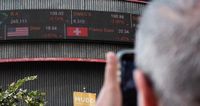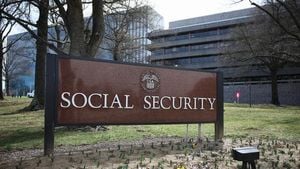The Mexican stock market opened on April 7, 2025, with significant losses, mirroring a global trend of declining stock markets for the third consecutive day. The main reference index of the Mexican Stock Exchange (BMV), the S&P/BMV IPC, fell more than 3% at the start of the day, reflecting fears of a global recession fueled by escalating trade tensions led by U.S. President Donald Trump.
Initially, the BMV's losses were exacerbated by the announcement of reciprocal tariffs imposed by the Trump administration on various nations. However, the situation shifted slightly after comments from White House economic advisor Kevin Hassett suggested that President Trump was considering a 90-day pause on tariffs for all countries except China. This news provided a brief respite, allowing the BMV to reduce its initial losses.
Before 9:00 AM, the S&P/BMV IPC had rebounded somewhat, marking a 0.55% increase, but still remained down by 0.86% at 51,009.14 points later in the morning. The FTSE BIVA index, which includes other assets, also reflected similar volatility, losing 0.68% to 1,039.66 points.
Despite the slight recovery, the BMV's performance was indicative of a broader trend. The previous trading session had concluded with a loss of 4.87%, marking the worst day for the Mexican stock market since June 2024. On this Monday, the S&P/BMV IPC was down 2.4% at 50,219.47 points shortly after the opening, leading to concerns about a ‘Black Monday’ effect as markets in Asia and Europe also faced significant declines.
In Asia, the Hang Seng index in Hong Kong plummeted by 13.2%, its largest single-day drop since October 2008, while Taiwan's Taiex index suffered a 9.7% decline, the most significant in its history. These declines were primarily driven by fears surrounding the ongoing trade war initiated by Trump, which saw tariffs imposed on a wide range of imports.
Back in the U.S., the S&P 500 entered a bear market after a cumulative drop of 20% from its February peak, with the index falling 1.57% to 4,994 units. The Dow Jones Industrial Average and Nasdaq also recorded substantial losses, prompting a flight to safety among investors who sought refuge in government bonds amid the escalating economic uncertainty.
As the situation unfolded, Treasury Secretary Scott Bessent reiterated that the tariffs would not lead to a recession, while Commerce Secretary Howard Lutnick confirmed that there would be no modifications or delays in the current tariff measures. This stance, however, did little to quell the concerns of investors, many of whom expressed fears over the long-term implications of a prolonged trade conflict.
Wall Street's reaction was stark, with the Dow Jones falling 1,212.98 points, or 3.17%, to 37,101.88 units, while the Nasdaq Composite dropped 623.23 points, or 4%, to 14,964.56 units. The volatility extended to commodity prices, which also deepened their declines as emerging currencies experienced strong fluctuations amidst a growing aversion to risk.
Gabriela Siller, director of economic analysis at Banco Base, emphasized that while the USMCA (formerly NAFTA) had shielded Mexico from reciprocal tariffs, the economic impact of U.S. tariffs could still adversely affect Mexico's GDP. She noted that the peso was under pressure, depreciating by 1.27% against the dollar, which was trading at 20.70 pesos. This depreciation reflected the close economic ties between the two countries and the potential for economic repercussions stemming from a slowdown in the U.S. economy.
Looking ahead, market operators adjusted their expectations regarding Federal Reserve actions, with a 55% probability of a 25 basis point rate cut anticipated at the next meeting on May 7, 2025. This adjustment was influenced by the pressures resulting from the new tariffs and the overall economic climate.
As the week unfolds, investors remain watchful of developments in the trade conflict and the potential for further volatility in financial markets. With the highest reciprocal tariffs set to come into effect on April 9, 2025, ranging from 11% to 50%, the outlook remains uncertain.
The situation serves as a stark reminder of the interconnectedness of global markets and the impact of political decisions on economic stability. As financial markets brace for potential further declines, the implications of Trump's trade policies continue to resonate across borders, affecting economies worldwide.









